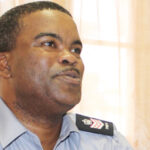Scores of Barbadians took to the streets of Bridgetown on Saturday to protest and lodge their objections to the proposed Cybercrime Bill 2024.
The march, which began just after 10 a.m. on the outskirts of Kensington Oval, made its way through the heart of The City and concluded at Independence Square, where a number of people spoke about their various concerns on the bill, which mostly centred around their fears that it will encroach on their freedom of speech.
One of the day’s speakers, veteran trade unionist and former opposition senator Caswell Franklyn, stated that while some aspects of the bill were positive in his opinion, some of the vague language in the legislation, which refers to embarrassment, insult, humiliation, and other terms, should be of great concern to those who believe in a free society.
“We want to bring the people’s attention to the draconian measures that parliament is about to put in place to deal with people who post things on the internet. You know you can be punished and sent to jail for up to seven years, and pay a fine of $70 000 or both, if you say something that hurts somebody’s feelings, if it is true.
“That is contrary to our law, that is contrary to how we behave. If you say something about some person, no matter how bad it is, if it is true, it is not defamation, but this bill is saying to you, that whether you are telling the truth or not, you can be prosecuted because you hurt somebody’s feelings,” he explained.
Previously, newly appointed Minister of Industry, Innovation, Science, and Technology Marsha Caddle defended the government’s new Cybercrime Bill, claiming that its goal is not to restrict general free speech, but rather to reduce the number of defamatory attacks and bullying online.
During last Monday’s Down to Brass Tacks radio programme on Voice of Barbados, she denied that the government is seeking to muzzle public criticism, but instead was aiming to combat defamatory attacks carried out online.
She said: “Defamation under this legislation carries the same burden of proof, carries the same test of law, as defamation in any other context. Why was a Computer Misuse Act, or a Cybercrime Bill necessary? It is because more and more, the way that people publish, the way that people communicate, is not simply by standing in the street and yelling profanities about somebody. It is not simply by creating a poster and putting it on a telephone pole. More and more, the majority of the communication in which people engage is online.
“There is nothing that would be considered defamation in tech, in speech, that is not considered defamation under this law. In other words, if you would not be allowed to call in on this programme and say something about [host] David Ellis, or say something about some public personality, or some private individual, then you cannot publish it online. This Act just makes reference to the place that the defamation is taking place.”
Franklyn, however, pushed back on langage of the bill, stating that the present administration, in his view, was benefiting greatly from their use of social media before 2018, and as such, should not seek to punish those who use social media as their opposition platform to government policy.
“The government that is in power now, they used social media to great effect when they were in opposition to oust the last party, and now they are saying to us, that what [they] did, is a criminal offence now. No way I can sit down and sit idly by.”
(SB)
The post Dozens march in protest against proposed Cybercrime Bill appeared first on Barbados Today.


